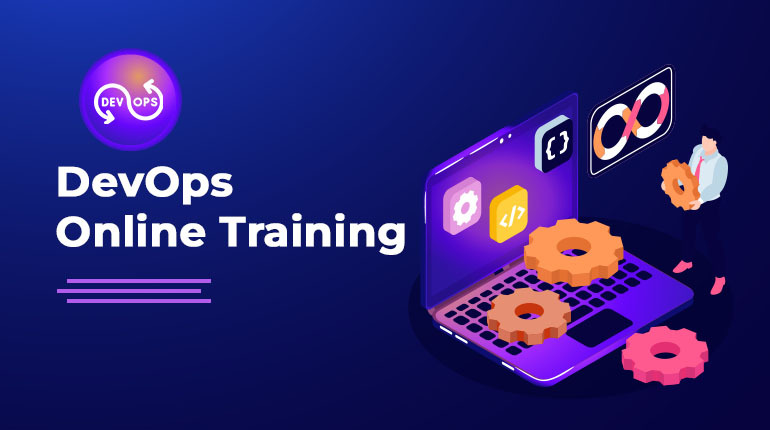DevOps online training

Course Overview
The term "DevOps" is a mashup of the phrases "development" and "operations." In the field of services, this DevOps architecture has grown in popularity. The planning, testing, and deployment of technologies fall within the purview of DevOps engineers. The cycle of system development is made simpler by DevOps principles. The upgrades to the applications need to be examined by DevOps experts as well. Our expert trainers are proactive and guide you to become a skilled DevOps professional.
Key Features of DevOps Training
-
Continuous integration and delivery: Automating the software build, test, and deployment process allows teams to deliver software updates more frequently and with fewer errors.
-
Automated testing: Automating the testing process helps to identify and fix software bugs early in the development process, reducing the need for manual testing and increasing the speed of software delivery.
-
Infrastructure as code: Managing and provisioning infrastructure using code allows teams to automate the process of setting up and configuring servers and other infrastructure, making it easier to scale and manage.
-
Monitoring and logging: Collecting and analyzing data from software systems allows teams to identify and troubleshoot issues in real-time, improving the overall reliability of the software.
-
Collaboration and communication: DevOps teams use tools and processes to foster collaboration, communication, and integration between developers and IT operations teams, enabling them to work together more effectively.
-
Continuous feedback loop: DevOps teams use feedback loops to gather customer and user feedback, which they use to make continuous improvements to the software and the development process.
-
Security: Security is integrated into the development pipeline and is considered from the beginning of the development process rather than being an afterthought.
- What is DevOps.,Why DevOps is needed.,CAMS (Culture, Automation, Measurement, Sharing) principles.
- The different perspectives of Dev and Ops,Different perspectives can cause conflict.,How to solve the problems with different approach and some tools.
- Tools that enable Continuous Integration and Delivery workflows,Measurement and the ways it helps IT and business,Tools that help with measurement
DevOps online Training
This course is open to IT experts, software testers, system administrators, solution architects, security engineers, application developers, integration specialists, and recently graduated students who want to start a career as a DevOps engineer.
-
Introduction to DevOps: Definition, history, and key concepts of DevOps.
-
Version Control Systems: Understanding the basics of version control systems such as Git, SVN, and Mercurial and how they are used in a DevOps context.
-
Continuous Integration: Understanding the principles of continuous integration and how to use tools such as Jenkins, Travis CI, and CircleCI to automate the software build, test, and deployment process.
-
Automated Testing: Understanding the principles of automated testing and how to use tools such as Selenium, JUnit, and TestNG to implement test-driven development (TDD) and behavior-driven development (BDD) methodologies.
-
Infrastructure as Code: Understanding the principles of infrastructure as code and how to use tools such as Ansible, Puppet, and Chef to manage and provision infrastructure, and how to use cloud-based platforms such as AWS and Azure to deploy software.
-
Containerization and Orchestration: Understanding the basics of containerization and orchestration and how to use tools such as Docker, Kubernetes, and Mesos to build, deploy, and scale software.
-
Monitoring and Logging: Understanding the principles of monitoring and logging and how to use tools such as Prometheus, Grafana, and Elasticsearch to identify and troubleshoot issues in real-time.
-
Security: Understanding the principles of security in the DevOps context, including authentication and access control, encryption, and secure communication, and the use of security testing tools.
-
Agile Methodologies: Understanding the principles of Agile development and how they are applied in a DevOps context, including Scrum, Kanban, and Lean.
-
Collaboration and Communication: Understanding the importance of effective collaboration and communication in a DevOps context and how to use tools such as Slack, Trello, and Jira to facilitate communication and collaboration.
-
Cultural Change and Leadership: Understanding the cultural and leadership changes that are required to implement a successful DevOps transformation, and learning how to lead and manage a DevOps team.
-
Configuration Management: Understanding the principles of configuration management and how to use tools such as Ansible and Puppet to automate the management of infrastructure and software configurations.
-
Cloud Computing: Understanding the basics of cloud computing and how to use cloud-based platforms such as AWS, Azure, and GCP to deploy and scale software.
-
Microservices: Understanding the principles of microservices architecture and how to use tools such as Kubernetes and Docker to build, deploy, and scale microservices-based applications.
-
CI/CD Pipeline: Understanding the principles of a CI/CD pipeline and how to use tools such as Jenkins, Travis CI, and CircleCI to automate the software build, test, and deployment process.
-
Automation: Understanding the importance of automation in a DevOps context and how to use tools such as Ansible, Puppet, and Chef to automate the management of infrastructure and software configurations.
-
Performance Testing: Understanding the principles of performance testing and how to use tools such as Apache JMeter and Gatling to measure and optimize the performance of software.
-
Continuous Feedback: Understanding the principles of continuous feedback and how to use tools such as Slack, Trello, and Jira to gather customer and user feedback and make continuous improvements to the software and development process.
-
Incident Management: Understanding the principles of incident management and how to use tools such as PagerDuty, OpsGenie, and VictorOps to identify and resolve incidents in real-time.
-
DevSecOps: Understanding the principles of security in a DevOps context and how to use tools such as SAST, DAST, and IAST to identify and mitigate security risks.
-
Metrics and Measurement: Understanding the importance of metrics and measurement in a DevOps context and how to use tools such as Prometheus and Grafana to collect and analyze data on software performance and usage.
-
ChatOps: Understanding the principles of ChatOps and how to use tools such as Slack, Microsoft Teams, and Mattermost to facilitate communication and collaboration within a DevOps team.
-
DevOps in practice: Hands-on experience and case studies of real-world DevOps implementations.
-
Case studies and Industry examples: Understanding the best practices and real-world examples of DevOps implementation across different industries.
-
Future of DevOps: Discussion of current trends and future developments in the field of DevOps, including emerging technologies, methodologies, and tools.
-
Conclusion and Future of DevOps: Discussion of current trends and future developments in the field of DevOps.
-
DevOps Online Training FAQ’s:
DevOps is the combination of cultural philosophies, practices, and tools that increases an organization's ability to deliver applications and services.
The main difference between DevOps and Agile is that DevOps is more focused on continuous delivery and integration, while Agile is more focused on iteration and customer feedback.
The prerequisites for this DevOps Certification Course include basic knowledge of Linux operating system and command line, as well as experience in any programming language.
DevOps Engineer are responsible for code deployments in the production environment. They work with the development team to make sure that code changes are properly implemented and don't cause adverse effects on application performance or stability. They also work with the operations team to ensure that changes can be made in a controlled and timely manner.
As part of the DevOps training, you will work on real-world projects that will help you master the skills required to be a successful DevOps engineer. These projects will cover topics such as automation, continuous delivery, and monitoring.
